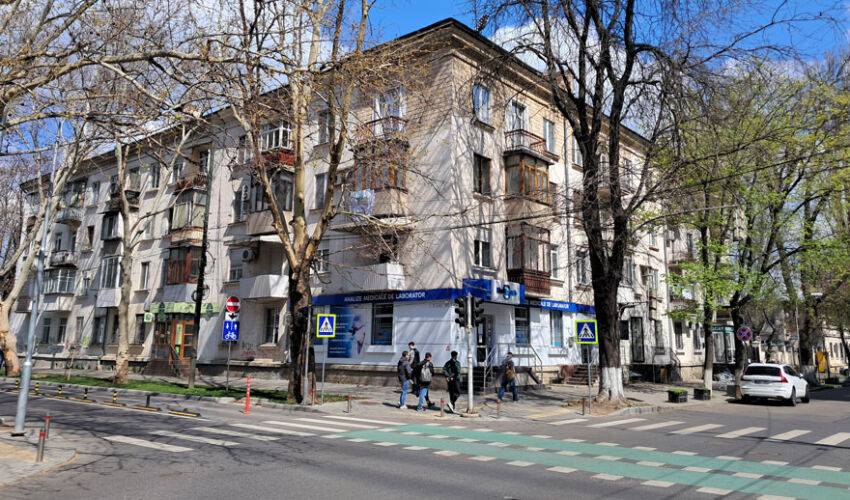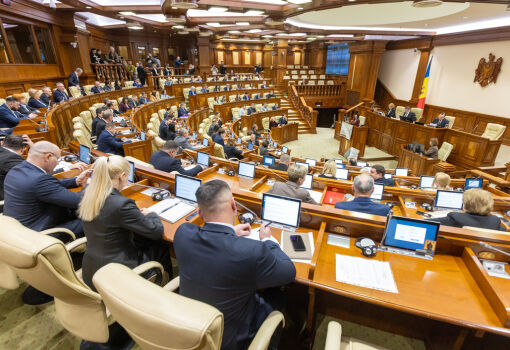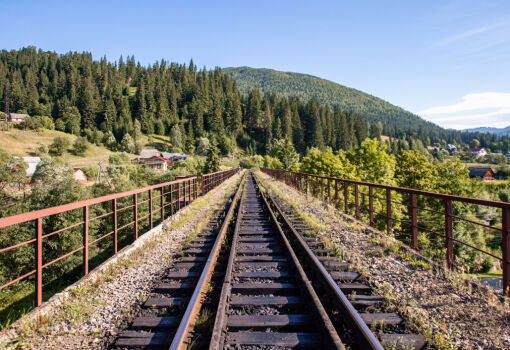
Photo by the author
According to the authorities’ estimates, as a result, residents of the capital will receive bills 30% less than they do now. According to the project, residents will be able to independently connect and disconnect heating in apartments, as well as regulate energy consumption.
How it is realized in practice, Logos Press found out from the residents of the house, in which such works were carried out two years ago. The house is located on the corner of August 31, 1989 and Bolgarskaya Street. It has four floors, four entrances and 56 apartments.
In 2022, the association of residents of this house received a grant of about 2 million lei from the National Center for Sustainable Energy (CNED) to convert the house to a horizontal heat supply system. It covered 80% of the costs of this work, with the remaining 20% paid by the tenants themselves.
Alexandru Zingaliuc, chairman of the Residents’ Association, said that within this project, a heating unit was installed in the basement of the house. It is a tank with a closed system, from which four pipes go to each entrance. Hot water is supplied there under pressure of three atmospheres, the working pressure in the pipes is 2.5 atm. The water in this boiler is heated by the main heat carrier coming from Termoelectrica. A heat meter for the house is also installed here. There are no special pumps, as the house has only four floors.
The old heating pipes and radiators were removed throughout the house.
According to the owner of a two-room apartment of 47 sq. m. Grigory, the following work was done: installation of a distribution system with stopcocks and meters of consumed hot water (outside, on the staircase landing); a hot water plant into the apartment; four heating points were installed (new radiators and pipes). Four because he decided to put two radiators in one room.
All the works cost him personally 6500 lei.
After two years of using the new system, Grigorii is very satisfied with it. It allows, as in the case of autonomous heating, to turn off the heat supply to the apartment in the morning, when you go to work, and turn on the heating in the evening. The room heats up quickly. In contrast to autonomous, when from the gas boiler coolant comes at a temperature of 35 degrees (in the minimum mode), from the heat point it comes heated to 52-55 degrees.
As a result, Grigori received a heating bill of 740.48 lei for the coldest month of this winter – February. With a compensation of 400 lei, he paid only 340 lei out of his money. Earlier, when Termoelectrica’s tariffs were much lower, the bills were 1500-1700 lei per month. Then, when heating became more expensive, the receipts showed approximately the same figures (taking into account the compensation from the government).
And last December, when he lived in another place and the heating was cut off for the whole month, the bill came to only 197.36 lei.
Overall, he has already recovered his investment for two years.
However, Alexandru Zingaliuc says that some residents of the same house received bigger bills than in the previous years. Probably because they set their apartments to a higher temperature and did not turn off the heating.
However, horizontal wiring is only a small part of what needs to be done to make a building truly energy efficient.
According to Oleksandr Zingalyuk, it is mandatory to: insulate the basement (upper floor) and make repairs there; change and insulate the roof; install double-glazed windows in one of the entrances (in three other entrances the residents have already installed them at their own expense); insulate the walls (optional).
The approximate estimate for these works is 9.5 million lei.
This week, CNED started accepting applications from residents’ associations for co-financing the energy rehabilitation of apartment buildings for just these types of works. The co-financing is carried out in the ratio of 70/30.
Many tenants of the building we are telling about want to participate in this project. But many are also against it. In the voting with a margin of only 0.18%, the latter won.
Grigori (who has to pay about 50 thousand lei for the listed works), is against it, and gives his arguments.
Basement and roof insulation are the problems of apartments on the first and last floors. They are cheaper in all houses, so their owners can pay for these works out of the money saved during the purchase. He also does not want to pay for double-glazed windows in someone else’s entrance. And he wonders why it is necessary to insulate the outer walls (they are 60 centimeters thick in a “Stalinist” house).
“I will never recoup this money,” he claims.
On the other hand, for a two-room, for example, an apartment in this house in our crazy times offer (not ask!) much more than 100 thousand euros. And people who are ready to lay out such money, quite logically want to live in a comfortable house. And they are ready to pay another 2.5 thousand euros for it.
Here their interests do not coincide with the “old” tenants, some of whom live rather poorly.
The struggle continues. This week the next meeting of tenants should be held, at which it is planned to revise the principle of voting: from 1 vote – 1 apartment per share, depending on the occupied area. Then, the association chairman believes, the supporters of full energy efficiency will be able to get the necessary 2/3 votes to win the vote.

